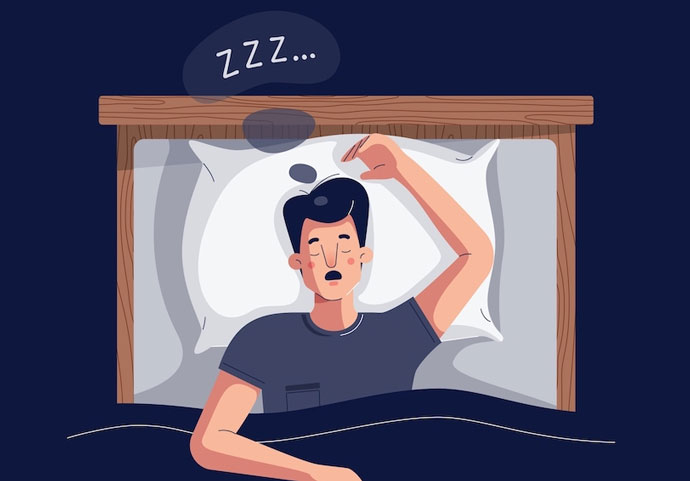Do you have trouble sleeping at night? If so, you are not alone. Millions of people around the world suffer from sleep problems. There are many different causes of sleeping problems, and it can be difficult to figure out what is causing them. In this blog post, we will discuss 10 common causes of sleeping problems and how to fix them!
Contents
Defining Sleeping Problems
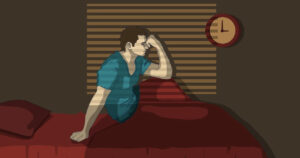 In the simplest words, sleeping problems are difficulties that people have when it comes to falling asleep or staying asleep. They can either fall asleep but wake up too early or sleep for long hours but still feel exhausted when they wake up.
In the simplest words, sleeping problems are difficulties that people have when it comes to falling asleep or staying asleep. They can either fall asleep but wake up too early or sleep for long hours but still feel exhausted when they wake up.
There are various kinds of sleeping problems, and their causes can differ from person to person. If you are someone who regularly experiences sleeping difficulties, it is important to figure out the root cause so that you can find a solution. The most common types of sleeping disorders are the following:
- Insomnia: This is the most common type of sleeping disorder, and it is characterized by difficulty falling asleep or staying asleep. People with insomnia often wake up feeling exhausted, even after sleeping for long hours.
- Sleep Apnea: This is a serious sleep disorder that occurs when a person’s breathing is interrupted during sleep. People with sleep apnea often snore loudly and wake up feeling exhausted.
- Restless Leg Syndrome: This is a disorder that causes an overwhelming urge to move the legs. People with restless leg syndrome often have difficulty falling asleep and staying asleep.
- Narcolepsy: This is a rare sleep disorder that causes people to fall asleep suddenly and without warning. People with narcolepsy often have difficulty staying awake during the day.
- Sleep Hypoventilation: This is a disorder that occurs when a person’s breathing is shallow and irregular during sleep.
- Hypersomnia: This is a disorder that causes people to sleep for long hours but still feel exhausted when they wake up.
These are all the different types of sleep disorders which are generally characterized by difficulty in falling asleep or staying asleep. But what causes these disorders? Let’s take a look at some of the major sleeping problems causes.
10 Causes Of Sleeping Problems
Sleep is a natural need of the body. So, when we struggle to get a good night’s sleep, it is usually because something is interfering with our body’s natural ability to sleep. The following are some of the most common causes of sleeping problems.
Physiological health issues
When our bodies are not physically healthy, it can be difficult to sleep. Physical health issues that can cause sleeping problems can include a variety of conditions, including (but not limited to):

- Arthritis
- Chronic pain
- Gastrointestinal issues
- Cancer
- Headaches or migraines
- Breathing issues
- Heart disease
- Kidney disease
- Menopause
- Polycystic ovary syndrome (PCOS)
- Pregnancy
- Thyroid problems
If you have any of these conditions, it is important to speak with your doctor about how you can manage your symptoms and get better sleep. These conditions take a toll on our bodies, and it is important to get proper treatment in order to get relief.
Psychological conditions
Our brain is rightly called the control center because it controls everything we do. So, when our brain is not functioning properly, it can lead to issues with our sleep. Some of the psychological conditions that may be a root cause of sleeping problems are:
- Anxiety
- Depression
- Bipolar disorder
- Schizophrenia
- Nightmares
- Post-traumatic stress disorder (PTSD)
- Attention deficit hyperactivity disorder (ADHD)
- Obsessive-Compulsive Disorder (OCD)
- Acute stress disorder
Because these disorders influence the way we think and feel, they can make it difficult to fall asleep or stay asleep. If you have any of these disorders, it is important to seek professional help so that you can get the treatment you need.
Certain medications
Medications are designed to help us, but sometimes they can have side effects that interfere with our sleep. Some of the most common medications that can cause sleeping problems are:

- Antidepressants
- Corticosteroids
- Stimulants
- ACE inhibitors
- Nasal decongestants
- Beta-blockers
- Nerve pain medication
- Cholinesterase inhibitors
- High blood pressure medication
- Thyroid medication
- Birth control pills
- Cold and allergy medicine
These contain chemicals and hormones that can disrupt our sleep. If you think your medication is causing sleeping problems, speak with your doctor about other options.
Genetics
This may seem unlikely and out of place, but genetics can play a role in our sleep. If you have a parent or grandparent who struggles with sleep, there is a chance that you may also have difficulty sleeping.
For example, you might notice that your parent might be a “light” sleeper, meaning they wake up easily and have difficulty falling back asleep. Or, your grandparent might be a “heavy” sleeper, meaning they sleep for long hours but still feel exhausted when they wake up. These are both genetic traits that can be passed down from generation to generation.
Moreover, there are certain sleep disorders that are genetic, such as narcolepsy and sleep apnea. If you have a family member with one of these disorders, you may be more likely to develop the disorder yourself.
Your schedule
We all know how fast paced our lives can be. With work, school, extracurricular activities, and social obligations, it can be difficult to find time to sleep. This can lead to a condition called social jet lag, which is when our internal clocks are out of sync with our social schedules.
This can happen when we change time zones (like when we travel), or when we stay up late on weekends and sleep in. Over time, this can lead to chronic sleep deprivation, which can have serious consequences on our health.
Moreover, some people’s jobs can cause sleeping problems. For example, if you work the night shift, your body may have difficulty adjusting to a nighttime sleep schedule. This can lead to insomnia and other sleep disorders.
Use of electronic devices before bed
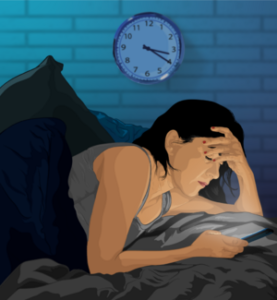 We all know just how much phones and computers have taken over our lives. And, while they can be helpful in many ways, they can also be harmful to our sleep. The blue light that is emitted from these devices can disrupt our natural sleep cycles.
We all know just how much phones and computers have taken over our lives. And, while they can be helpful in many ways, they can also be harmful to our sleep. The blue light that is emitted from these devices can disrupt our natural sleep cycles.
In addition, the content we consume on these devices can also keep us up at night. For example, if you watch a horror movie before bed, you may have trouble falling asleep because you are thinking about the movie. The same goes for reading the news or checking social media. If you see something that upsets you, it can cause anxiety and make it difficult to fall asleep.
There are also a lot of biological and physiological impacts of cellphone usage before bed. According to research, “using a cellphone before bed delays the onset of sleep, reduces total sleep time, and causes more next-day fatigue.” It also impacts what is known as our bodies’ circadian rhythm. This is our internal clock that regulates when we feel sleepy and when we feel awake. Too much of blue light exposure can disrupt our circadian rhythm and make it difficult to sleep.
In short, using electronic devices before bed can have a major impact on our sleep. If you are struggling to sleep, it is best to avoid these devices in the hours leading up to bedtime.
Age
As and when we grow older, our sleep patterns change. For example, newborns sleep for about 16 hours a day, while adults typically sleep for around seven to eight hours.
As we age, we also tend to have more trouble sleeping. This is because our bodies go through changes that can impact our sleep. For example, older adults may have more health problems that make it difficult to sleep. They may also take medications that can interfere with sleep.
In addition, older adults often have trouble staying asleep for long periods of time. This is because they tend to wake up more during the night. As we age, we also produce less of a hormone called melatonin, which helps us sleep.
Additionally, the stress of responsibilities and the loss of loved ones can also make it difficult to sleep as we age. This is because the emotional impact of these events can cause anxiety and make it difficult to fall asleep.
All of these factors can lead to sleeping problems in older adults.
Sleeping environment
The environment plays a big role in our sleep. If our bedroom is not set up for optimal sleep, it can make it harder to fall asleep and stay asleep. Some environmental factors that can cause sleeping problems are:
- Light: Too much light exposure before bed can make it difficult to fall asleep. Make sure your bedroom is dark and cool before you go to bed.
- Sound: Too much noise exposure can also make it difficult to sleep. Make sure your bedroom is quiet and peaceful so that you can get the rest you need.
- Temperature: The temperature of your room can also affect your sleep. If it is too hot or too cold, it can make it difficult to get comfortable and fall asleep.
- Privacy: If you live with others, it is important to have a space that is private and quiet so that you can sleep without interruption.
- Comfort: Lastly, if you are not comfortable, it can make it difficult to fall asleep and stay asleep. Some causes of discomfort in bed are an uncomfortable mattress, pillows that are too soft or too hard, and sheets that are scratchy.
If you are not comfortable in your bedroom, it can be difficult to sleep. Make sure your bedroom is dark, quiet, and cool in order to create the best environment for sleep.
Stress
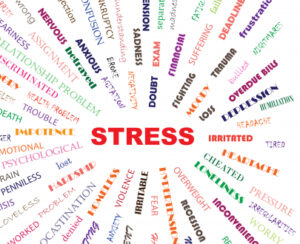 Stress is rightly known as the silent killer. It not only physically manifests in the form of diseases but also causes mental breakdowns and emotional imbalances. Stress can also cause sleeping problems. This is because when we are stressed, our bodies produce more of the hormone cortisol. Cortisol is a stress hormone that helps us cope with stressful situations. However, too much cortisol can make it difficult to fall asleep and stay asleep.
Stress is rightly known as the silent killer. It not only physically manifests in the form of diseases but also causes mental breakdowns and emotional imbalances. Stress can also cause sleeping problems. This is because when we are stressed, our bodies produce more of the hormone cortisol. Cortisol is a stress hormone that helps us cope with stressful situations. However, too much cortisol can make it difficult to fall asleep and stay asleep.
In addition, stress can cause anxiety, which can also make it difficult to sleep. Often you may find yourself spiraling and overthinking when you are trying to sleep, which can make it even harder to fall asleep. Moreover, stress also makes it difficult to stay asleep. This is because when we are stressed, we tend to wake up more during the night.
Diet
What we consume has a direct impact on how we feel. If we eat foods that are unhealthy, it can make us feel anxious and make it difficult to sleep. For example, if your diet is high in sugar, it can cause a spike in your blood sugar levels. This can make you feel energetic and make it difficult to fall asleep.
In addition, if you consume caffeine late in the day, it can also interfere with your sleep. Caffeine is a stimulant that can make it difficult to fall asleep. It is typically found in coffee, tea, or chocolates. Some other foods/drinks that cause disturbances in sleep are:
- Spicy foods
- Fried foods
- Acidic foods
- Fizzy drinks
- Dried fruit
- Alcohol
It is important to be aware of what you are consuming and how it might be affecting your sleep. If you find that certain foods or drinks are causing you to sleep poorly, try avoiding them before bed.
These are all the possible causes why one might have sleeping problems. It is possible one may have one or multiple causes for their sleeping difficulties. It is important to look at all the possible causes in order to address the problem correctly.
Ways To Deal With Sleeping Problems Causes
Now that you know some of the most common causes of sleeping problems, you can start to look for solutions. If you think your sleeping problems are caused by a health condition, seek help from the right professional.
Self-help tips
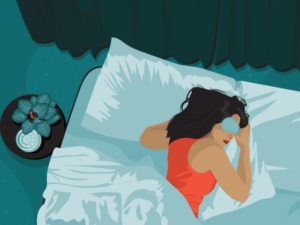
Self-help is the ultimate solution to all our problems. If the problem is minor, it can be solved with a few simple lifestyle changes.
- If you think your sleeping problems are caused by stress, anxiety, or depression, try some relaxation techniques such as yoga or meditation. These activities can help you to relax and feel more comfortable at night.
- Physical activity is also a great way to reduce stress and anxiety. It can also help you to sleep better at night. Try to get at least 30 minutes of exercise every day.
- It is also important to create a good sleep environment. This means making sure your bedroom is dark, quiet, and cool. In addition, try to avoid watching television or working on the computer before bed. The light from these screens can make it difficult to fall asleep. Instead, try reading a book or listening to calm music before bed.
- Creating a bedtime routine can also help you to sleep better at night. This may include taking a bath, reading, or writing in a journal. Doing the same thing every night will signal to your body that it is time to sleep.
- Taking a bath can also help you to fall asleep. This is because the warmth of the water can relax your muscles and help you to feel sleepy. You may also want to add some essential oils or Epsom salts to your bath to help you relax.
All these tips have been known to help people with sleeping problems. Try out different techniques and see what works best for you. You may need to experiment with different things before you find what works.
Professional techniques
If your sleeping problems are severe, you may need to seek help from a sleep specialist. This is a doctor who specializes in treating sleeping disorders. They can help you to find the root cause of your problem and provide you with treatment options. Some of the most effective methods of professional help are:
- Therapy: Therapy is the process of talking to a therapist about your problems. This can help you to identify the root cause of your sleep difficulties. It can also help you to learn new coping mechanisms to deal with your problem. Some of the most common and effective therapy approaches include:
Stimulus control therapy
Expressive art therapy
Clinical hypnosis
These all help to improve sleep by teaching different techniques. Your therapist will work with you to decide the most suitable option for you.
- Medication: Medication is yet another way to help improve sleep. If your sleeping difficulties are caused by a health condition, medication can be very effective. Some of the most common medications used to treat sleep disorders include:
Antidepressants
Anti-anxiety medications
Stimulants
Sedatives
Hypnotics
Sleep aids
Your doctor will work with you to decide the best medication for you. They will also monitor your progress to make sure the medication is working effectively.
- Surgery: Surgery is a last resort for treating sleep disorders. It is only recommended if other methods have failed and the condition is causing severe problems. Some of the most common types of surgery used to treat sleep disorders include:
Uvulopalatopharyngoplasty
Laser-assisted uvulopalatoplasty
Radiofrequency ablation
These procedures all help to improve sleep by making the airway wider. This makes it easier to breathe and decreases snoring.
- Massage therapy: Massage therapy is another option that can help to improve sleep. It can be very relaxing and help to reduce stress and anxiety. This, in turn, can help you to sleep better at night.
- Aromatherapy: Aromatherapy is another option that can help you to relax and improve sleep. This involves using essential oils to promote relaxation. Some of the most common essential oils used for this purpose include lavender oil, chamomile oil, ylang-ylang oil, bergamot oil These oils can be used in diffusers, baths, or massages.
- Acupuncture: Acupuncture is a traditional Chinese medicine that involves inserting needles into pressure points. This can help to relieve pain and promote relaxation. It is often used as a treatment for insomnia.
- Biofeedback: Biofeedback is a technique that can help you to control your body’s response to stress. This can be done through different methods, such as heart rate variability biofeedback, respiration biofeedback, electromyography biofeedback, and thermal feedback. This technique can help you to learn how to control your body’s response to stress. This, in turn, can help you to sleep better at night.
Sleeping disorders can be caused by a variety of different things. However, there are many ways to treat them. If you are having difficulty sleeping, talk to your doctor about the different treatment options available. With proper treatment, you can get a good night’s sleep and improve your life quality.
Conclusion
In conclusion of the above, we can say that sleeping problems are a common issue that can be caused by many different things. We know all the possible sleeping problems causes and ways and techniques to deal with them. It is important to seek professional help if you are struggling to sleep. With the right treatment, you can improve your sleep and quality of life.
If you or someone you know is struggling with depression, Therapy Mantra is here for you. We are the leading providers of online therapy and counseling. Our team of highly trained and experienced therapists can help you work through your depression. Contact us today to learn more about our services. You may also visit our website to book an online therapy session or download our free Android or iOS app for more information.
